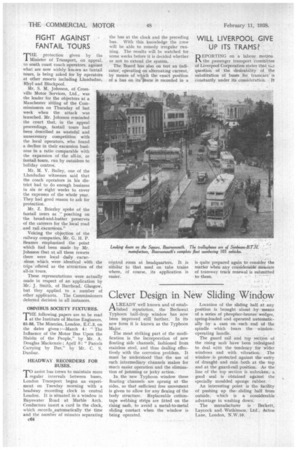FIGHT AGAINST FANTAIL TOURS
Page 114

If you've noticed an error in this article please click here to report it so we can fix it.
of Transport, on appeal, to south coast coach operators, against what are now widely known as fantail tours, is being asked for by operators at other resorts including Llandudno, Rhyl and Blackpool.
Mr. S. M. Johnson, of Crossville Motor Services, Ltd., was the leader for the objectors at a Manchester sitting of the Commissioners on Thursday of last week when the attack was launched. Mr. Johnson reminded the court that, in the appeal proceedings, fantail tours had been described as wasteful and unnecessary competition with the local operators, who found a decline in their excursion business in a ratio comparable with the expansion of the all-in, or fantail tours, run by outsiders to holiday centres.
Mr. M. V. Bailey, one of the Llandudno witnesses said that the coach operators in his district had to do enough business in six or eight weeks to cover the expenses of the whole year. They had good reason to ask for protection.
Mr. Z. Brierley spoke of the fantail tours as "poaching on the bread-and-butter preserves of the caterers for the local road and rail excursions."
Voicing the objection of the railway companies, Mr. G. H. P. Beames emphasized the point which had been made by Mr. Johnson that at all these resorts there were local daily excursions which were identical with the trips offered as the attraction of the all-in tours.
These representations were actually made in respect of an application by Mr. J. Smith, of Barrhead, Glasgow, but they applied to a number of other applicants. The Commissioners deferred decision in all instances.
OMNIBUS SOCIETY FIXTURES.
THE following. papers are to be read at the Institute of Marine Engineers, 85-88, The Minories, London, E.C.3, on the dates given :—March 4: " The Influence of the Motor Bus Upon the Habits of the People," by Mr. A. Douglas Mackenzie ; April 8: "Parcels Carrying by Bus," by Mr. C. S. Dunbar.
HEADWAY RECORDERS FOR BUSES.
MO assist bus crews to maintain more 1 regular intervals between buses, London Transport began an experiment on Tuesday morning with a headway recording clock in central London. It is situated in a window in Bayswater Road at Marble Arch. Conductors insert a card in the clock, which records automatically the time and the number of minutes separating c84 the bus at the clock and the preceding bus. With this knowledge the crew will be able to remedy irregular running. The results will be watched for some weeks before it is decided whether or not to extend the system.
The Board has also on test an indicator, operating on alternating current, by means of which the exact position of a bus on its route is recorded in a control room at headquarters. It is similar to that used on tube trains where, of course, its application is easier.
WILL LIVERPOOL GIVE UP ITS TRAMS?
REPORTING on a labour motion IN. the passenger transport committee of Liverpool Corporation states that t;‘3 question of the desirability of the substitution of buses for tramcars is Constantly under its consideration. It
is quite prepared again to consider the matter when any considerable measure of tramway track renewal is submitted tot hem. '




























































































































































